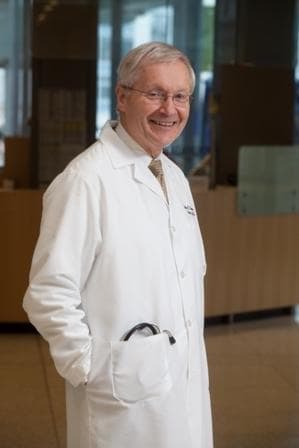Advertisement
'Everyone Needs A Caring Listener': Gut Doctor Wins Compassion Prize

Dr. John Zawacki grew up on the grounds of Taunton State Hospital, the huge psychiatric hospital now so old the state is in the process of closing it. As a child, he would say good night to the mentally ill patients waiting in the hallway outside his psychiatrist-father's home office on his way to bed. He recalls:
"When I asked Dad why people needed a psychiatrist, he said: 'John, everyone needs a caring listener sometime in their lives." When young John expressed interest in becoming a doctor, his father had him spend the summer in the psychiatric hospital's back wards, cleaning up incontinent male patients. The point: "There is no job which is beneath you."
John went on to become a gastroenterologist and a professor of medicine at UMass Medical School, treating patients with tough disorders like Crohn's, colitis and inflammatory bowel disease. And he must have treated them with extraordinary kindness, because he has just won the annual Schwartz Center Compassionate Caregiver Award. Check out last year's winner, a hospice worker, here, and here's an inspiring Schwartz Center video of this year's five finalists, two nurses and three doctors.
Here are excerpts from Dr. Zawacki's remarks last night at the Schwartz Center dinner:
I feel both honored and humbled to receive the Schwartz Center compassionate caregiver award, honored by those who wrote letters on my behalf, and humbled by the other four equally deserving nominees.
I believe compassion is a gift, which like the seed in the parable of the sower can fall on a variety of soils which can be variably nurtured and produce 10, 20 or 100-fold. I have been nurtured by many people throughout my life. Among them: Nurses, nursing assistants, technicians, secretaries and custodians who model compassionate care for anyone with eyes to see and ears to hear.
...
It all began with my Dad, who modeled for me what it means to be a compassionate caregiver on a daily basis. From the 1940s until the early 1960s, he was the assistant superintendent of the 1600-bed Taunton Psychiatric State Hospital by day, and then by night a psychiatrist in private practice. His office was in our home on the grounds.
...After I had instigated a fight between two neighborhood boys, Dad took me aside, peered down at me from his almost 6-foot-2-inch height and said, 'The day you think you are better than someone else, I will kick the you-know-what out of you." That's what I call directive counseling, coming from a psychiatrist. I think of that day whenever I encounter a patient who is down-and-out.
So, how do we nurture compassion in our present and future caregivers? In a recent article in the New England Journal of Medicine called "A cure for the common cold," David Watts states that patients often describe their doctors as cold and distant. My patients frequently tell me the same thing about other caregivers they've encountered.
Yet physicians don't start out that way. At UMass when I present a young woman to first-year medical students who suffers not only the ravages of Crohn's disease but who is also burdened with a young husband disabled by a stroke ad a teenage daughter requiring repeated hospitalizations for depression, and who most recently began caring for a nephew needing a "stable home," I can see by the expressions on their faces that they are touched.
But studies indicate that by the third year, medical students change. Maybe, as Dr. Watts writes, "We have so much science crammed into our brains we lose touch with humanistic practices and values. Perhaps, we fear we will somehow be diminished if we allow ourselves to be affected by the pain of others. Or maybe we just think we don't have time to be compassionate.
I would agree with Dr. Watts who suggests that all medical schools should focus on championing compassion in the same way that they value grant-writing skills. I will leave it to the educators to determine whether this is best accomplished through literature, poetry, storytelling, or role models. Certainly, the Schwartz Center round have been a wonderful contribution to our profession.
This program aired on November 9, 2012. The audio for this program is not available.


